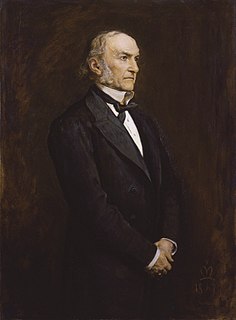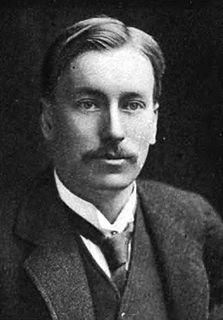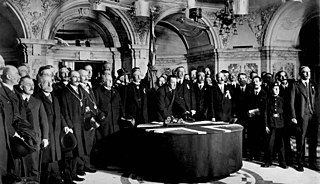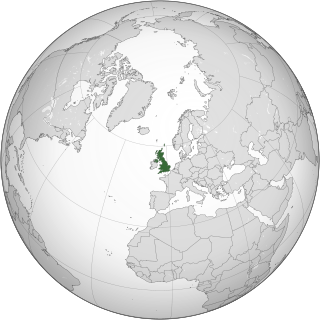Simon Rosenbaum B.Sc. (born 1877) was a British academic active in the early twentieth century, whose major field of study was statistics. He is perhaps best known today for an editing a collection of essays entitled Against Home Rule: The Case for Union, which was first published in 1912 at the height of the crisis over Irish Home Rule. Contributors to this work included Arthur Balfour, Austen Chamberlain, and Leo Amery.

The history of the United Kingdom began in the early eighteenth century with the Treaty of Union and Acts of Union. The core of the United Kingdom as a unified state came into being in 1707 with the political union of the kingdoms of England and Scotland, into a new unitary state called Great Britain. Of this new state of Great Britain, the historian Simon Schama said:
What began as a hostile merger would end in a full partnership in the most powerful going concern in the world... it was one of the most astonishing transformations in European history.

The United Kingdom of Great Britain and Ireland was a sovereign state that existed between 1801 and 1922. It was established by the Acts of Union 1800, which merged the Kingdom of Great Britain and the Kingdom of Ireland into a unified state. The establishment of the Irish Free State in 1922 led to the remainder later being renamed the United Kingdom of Great Britain and Northern Ireland in 1927.

Karl Pearson was an English mathematician and biostatistician. He has been credited with establishing the discipline of mathematical statistics. He founded the world's first university statistics department at University College, London in 1911, and contributed significantly to the field of biometrics and meteorology. Pearson was also a proponent of social Darwinism, eugenics and scientific racism. Pearson was a protégé and biographer of Sir Francis Galton. He edited and completed both William Kingdon Clifford's Common Sense of the Exact Sciences (1885) and Isaac Todhunter's History of the Theory of Elasticity, Vol. 1 (1886–1893) and Vol. 2 (1893), following their deaths.

"Lies, damned lies, and statistics" is a phrase describing the persuasive power of statistics to bolster weak arguments. It is also sometimes colloquially used to doubt statistics used to prove an opponent's point.

Sir Robert Giffen was a Scottish statistician and economist.
Sir Arthur Lyon Bowley, FBA was an English statistician and economist who worked on economic statistics and pioneered the use of sampling techniques in social surveys.

Colin Grant Clark was a British and Australian economist and statistician who worked in both the United Kingdom and Australia. He pioneered the use of gross national product (GNP) as the basis for studying national economies.

Gladstonian liberalism is a political doctrine named after the British Victorian Prime Minister and leader of the Liberal Party, William Ewart Gladstone. Gladstonian liberalism consisted of limited government expenditure and low taxation whilst making sure government had balanced budgets and the classical liberal stress on self-help and freedom of choice. Gladstonian liberalism also emphasised free trade, little government intervention in the economy and equality of opportunity through institutional reform. It is referred to as laissez-faire or classical liberalism in the United Kingdom and is often compared to Thatcherism.

The National Insurance Act 1911 created National Insurance, originally a system of health insurance for industrial workers in Great Britain based on contributions from employers, the government, and the workers themselves. It was one of the foundations of the modern welfare state. It also provided unemployment insurance for designated cyclical industries. It formed part of the wider social welfare reforms of the Liberal Governments of 1906–1915, led by Henry Campbell-Bannerman and H. H. Asquith. David Lloyd George, the Liberal Chancellor of the Exchequer, was the prime moving force behind its design, negotiations with doctors and other interest groups, and final passage, assisted by Home Secretary Winston Churchill.

Francis Wrigley Hirst was a British journalist, writer and editor of The Economist magazine. He was a Liberal in party terms and a classical liberal in ideology.

Harold Cox was a Liberal MP for Preston from 1906 to 1910.

The Liberal government of the United Kingdom of Great Britain and Ireland that began in 1905 and ended in 1915 consisted of two ministries: the first led by Henry Campbell-Bannerman and the final three by H. H. Asquith.
The Journal of the Royal Statistical Society is a peer-reviewed scientific journal of statistics. It comprises three series and is published by Blackwell Publishing for the Royal Statistical Society.

The regions, formerly known as the government office regions, are the highest tier of sub-national division in England, established in 1994. Between 1994 and 2011, nine regions had officially devolved functions within government. While they no longer fulfil this role, they continue to be used for statistical and some administrative purposes. While the UK was a member of the European Union, they defined areas (constituencies) for the purposes of elections to the European Parliament. Eurostat also used them to demarcate first level Nomenclature of Territorial Units for Statistics (NUTS) regions within the European Union, which in 2021 were superseded by International Territorial Level (ITL) regions. The regions generally follow the boundaries of the former standard regions, established in the 1940s for statistical purposes.

The Irish Home Rule movement was a movement that campaigned for self-government for Ireland within the United Kingdom of Great Britain and Ireland. It was the dominant political movement of Irish nationalism from 1870 to the end of World War I.

The Home Rule Crisis was a political and military crisis in the United Kingdom of Great Britain and Ireland that followed the introduction of the Third Home Rule Bill in the House of Commons of the United Kingdom in 1912. Unionists in Ulster, determined to prevent any measure of home rule for Ireland, formed a paramilitary force, the Ulster Volunteers, which threatened to resist by force of arms the implementation of the Act and the authority of any Dublin Parliament. Irish nationalists responded by setting up the Irish Volunteers "to secure the rights and liberties common to all the people of Ireland". Both sides then began importing weapons and ammunition from Germany, in the Larne gun-running and Howth gun-running incidents. HM Government's ability to face down unionist defiance was thrown into question by the "Curragh incident", when dozens of British Army officers tendered their resignations rather than secure arms against Ulster loyalist seizure, forcing a climb-down by the government. The crisis was temporarily averted by the outbreak of World War I. The Home Rule Bill was enacted, but its implementation was suspended for the duration of the war.
The history of trade unions in the United Kingdom covers British trade union organisation, activity, ideas, politics, and impact, from the early 19th century to the present.

Latin America–United Kingdom relations are the diplomatic, economic and cultural relations between the United Kingdom and the countries of Latin America.
Anarchism in Malaysia arose from the revolutionary activities of Chinese immigrants in British Malaya, who were the first to construct an organized anarchist movement in the country - reaching its peak during the 1920s. After a campaign of repression by the British authorities, anarchism was supplanted by Bolshevism as the leading revolutionary current, until the resurgence of the anarchist movement during the 1980s, as part of the Malaysian punk scene.